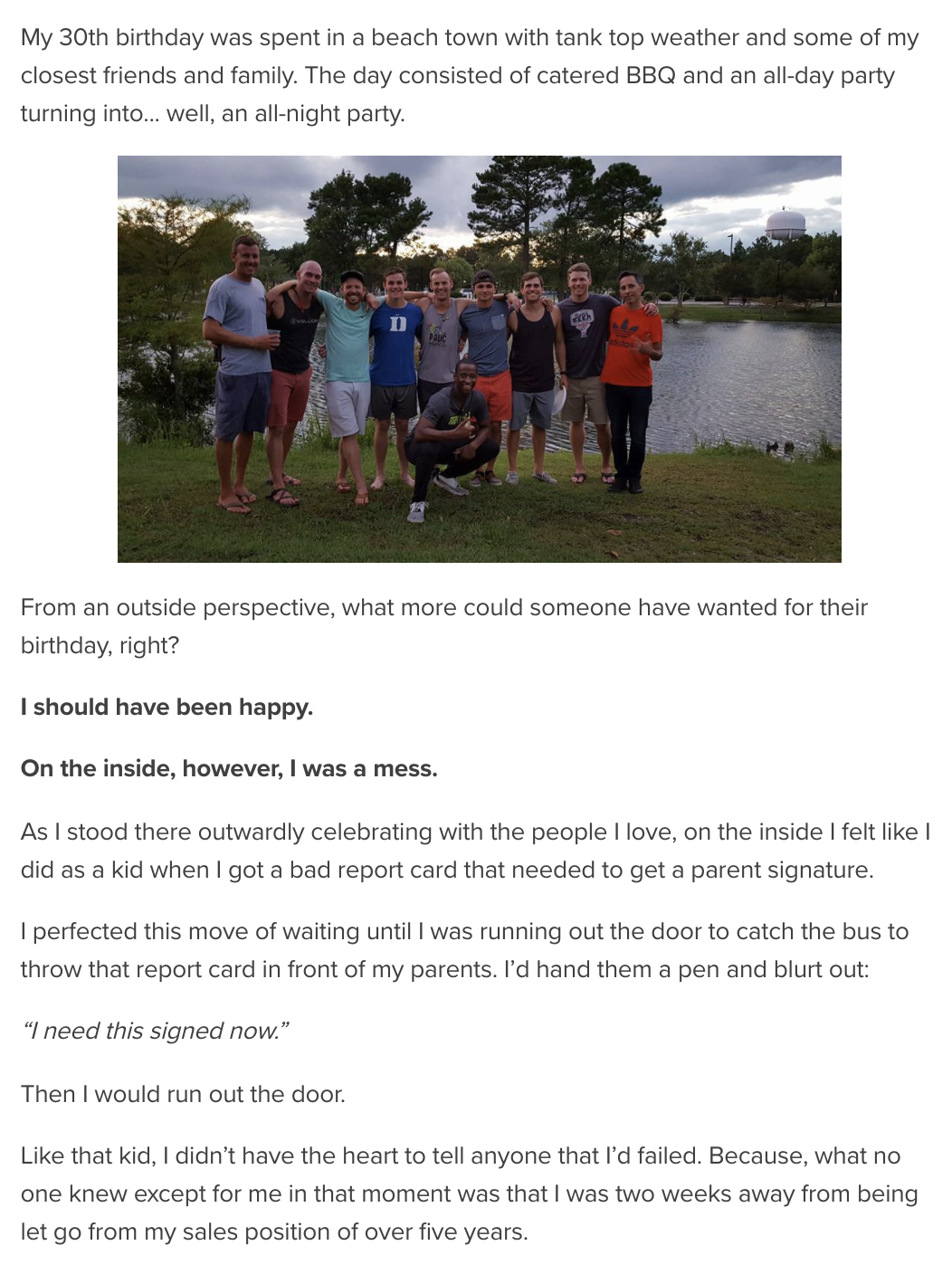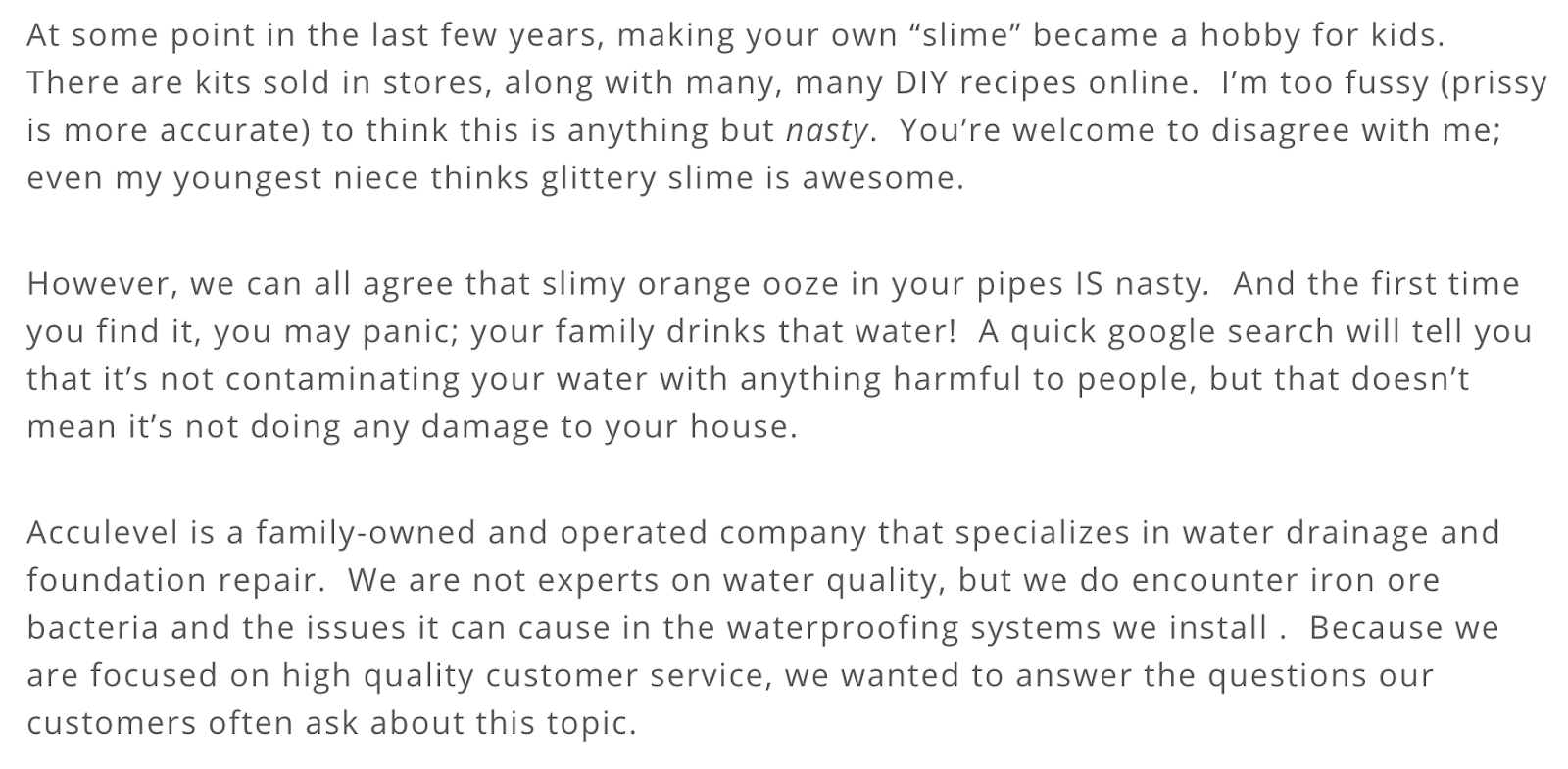Subscribe now and get the latest podcast releases delivered straight to your inbox.
Here’s a fun introspective exercise. I’m going to go through some of the more animated ways that my teammates here at IMPACT have referred to me: snarky, sarcastic, sassy, having “dry British humor,” and being prickly.
So, when our editorial director told me that I needed to bring my personality into my content, my first response was:
“Do you really want me to do that? Don’t we want to actually make money with our content?”
I figured something was getting lost in translation, so I just nodded to Liz and played along. I had built this narrative in my head that business blog content needed to be written like a term paper.
In my mind, blog content was supposed to be professional, buttoned-up, and written for business leaders who wear suits from companies with names that I can’t pronounce.
But who in their right mind likes reading term papers?
You could write the most factually accurate and insightful article in the world — but at the end of the day if your ideal buyers don’t remember who wrote it, does it matter?
Ultimately, people want to work with and end up buying from people and companies they like and trust. The entire reason that business blogging exists is to create content that leads to revenue. Yes, you have to know what you’re talking about and be informative and helpful. But without a personality behind the words, you’ll be easily forgotten as another article in the Google abyss.
This article will help guide you through the always awkward and often painful process of bringing personality into your articles. Imagine you’re giving a wedding speech and needing to learn what to do with your hands — it’s this kind of pain.
By mastering some of the tips and techniques in here, you’ll be able to write killer articles that stand out from the ordinary and help you generate more sales.
First, you have to give yourself permission to be yourself
You’re going to have this feeling that there’s no way you can write in a way that mimics how you would talk to your friends. When you start writing, you’ll naturally want to leave your personality out of an article. It’s much easier to rely on statistics, third-party quotes, and generic examples to feel like you’re making a point that actually has substance.
It’s likely that your competitors at this point are also blogging to get found by new prospects and to increase sales. So you can try to duke it out and create better content by having better on-page SEO, choosing great keywords, and finding better sources and facts. But this approach puts your success in the hands of Google, who could decide to release an algorithm update overnight that drops your traffic by 40%.
Instead your content can compete on an entirely different plane.
You have one special weapon in creating content that no competitor can replicate. Bringing your unique personality into every blog. People relate to people, not to statistics or the best factual argument.
When people land on your blog, does it look like every other blog on the same topic? Or does your blog seem like it’s written by an actual human who a potential buyer could see themselves having a conversation with?
Writing with your personality is a competitive advantage in a world where everyone is blogging to try to convince prospects to buy from them. If you can show a glimpse of the personality that makes you a real relatable person, your content will keep people around longer and excite them to continue consuming more content.
So right now, let’s agree that in order for you to create great content that can speak (and stand out) to potential buyers that personality is an advantage. I need you to also agree with you’re going to stop writing like a company-branded robot and be unabashedly yourself in your content. I’m picturing a head nod, so I’ll take that as non-verbal consent that you’re willing to move forward.
But how do you infuse your personality into your content, without it seeming forced or insincere?
Make a list of the things that make you unique
There is a good part of who you are that anybody looking at your resume or online profiles would be able to pick up. But this is not what makes you unique as a person. These are the surface level things that you might have in common with people. Instead, we want to focus on the things that your best friends find endearing about you or that help people you’ve never met feel comfortable with you right away.
The first step in bringing personality into your writing is to make a self-aware list of the things that make you unique as a person. These don’t have to be business-related, but as a person who lives on Earth, what makes you unique?
This list will become your personal reservoir of things that people will find interesting and relatable. Any time you’re writing a blog and are looking for inspiration to help you write with personality, this will be where you can turn.
"What does your list include, Brian?"
I'm so glad you asked:
- Loving to know bands and musicians before anybody else does, but then having the top artists in my Spotify Year In Review filled with Girl Pop.
- Truly enjoying the finer things in life like bath bombs, essential oil diffusers, and Woodwick candles.
- Friday Night Lights is my favorite movie because the protagonist loses and I love that it breaks the typical sports movie mold.
- Having very little to say on company Zoom meetings, but littering the chat with sarcastic messages.
- I was born in Texas, lived in Texas for five years, and proudly claim to be a Texan. I’ve lived in North Carolina for 28 years.
Creating a list of the things that make you unique gives you an arsenal of quirks and stories that can truly break through the noise.
Take for example something you might find on my resume:
I have six years of sales experience. Let’s say that I mention in an article that I’ve worked in sales for six years in an effort to relate to people trying to sell their products or services. It would be a nice attempt to create relatability, but wouldn’t really resonate.
But let’s look at how I could actually make this experience unique to me and how it might help people looking to increase sales relate to me as a writer.
I struggled my way through six years of being a salesperson. I constantly was being told that I needed to make more calls to stay top of mind and to form better relationships with customers. I hated feeling pushy and that I was selling a commoditized product.
After being fired, I discovered inbound and content marketing. Literally, every struggle I fought through on a daily basis was being heard and addressed. Although I didn’t have the chops to make it in the world of sales, I loved being in the business world and helping people that had a genuine sales need.
So, as a result, I love being a content marketing trainer because I help buyers and sellers find each other without buyers feeling attacked and without sellers feeling like pushy used-car salespeople.
By making things personal, you make yourself as a seller relatable and build trust. When a buyer really trusts you, is where sales happen.
So, create your list of the things that make you authentically you and use this as a reminder that nobody else in the world can write the content like you. This list will become the foundation for all of the other tactics we’ll discuss in this article.
Use examples and stories from your life
A great way to bring a personal touch to your blog articles is to talk about your own life and experiences. Personal examples and stories allow the reader to put themselves in your shoes. It’s likely they have had a similar experience. These shared experiences allow you to create a bond with the reader that helps them trust what you’re saying.
For example, let’s say I’m writing an article about the top problems that first time home buyers need to avoid. (An article I wish I’d been able to read about a month ago.)
Option 1
"One of the issues that might come up is a substantial difference in the estimated total cost to close and the final cost. You’ll get an estimated cost to close during the loan application phase, but the final cost to close two days prior to closing day."
Option 2
"One of the issues that might come up is a substantial difference in the estimated total cost to close and the final cost.
Every single time that I’ve bought a home (one time now), this has happened. You’ll be given an estimated total amount of money that you’ll need to bring to closing day when you apply for a loan.
Two days before you close, you’ll get the final amount. And it could change completely. For me, it was a $1,600 difference, and not the fun kind of difference where you save money."
As I’m describing this issue, differences between the estimated and final costs to close on a house, what impression do you get from the first option?
I’m guessing that you think it’s educational and factually accurate, which is great. But it doesn’t quite seem to drive the point home and help you feel the weight of this issue if you’re a first-time homebuyer.
How do you feel about the second option?
Well you know that I’ve gone through this before. You know that I myself was a first-time homebuyer very recently. Now we’re sharing in this experience together.
Bad examples are generic. They could have been written by anybody in the world. This makes your content generic, templated, and easily replicable.
Good examples, ones that are specific and personal, build trust with the reader. Your content becomes instantly more memorable, relatable, and unique.
One of the biggest hurdles in writing content is relating to your audience. We’ve all read an article and said to ourselves:
“That’s great that it worked for them. But that could never work for my super unique company that does counseling for Ultimate Frisbee players sadly trudging through the COVID-forced transition to disc golf.”
OK, maybe not that exact response. Still, the “But I’m different” epidemic is a natural response to new information.
Buyers are skeptical of new solutions, new products, and changing the way they’ve always done things. In order to break through that mindset, content needs to be memorable and relatable - something using bad generic examples simply can’t do.
Be honest with how you would feel or have felt
I’ve got at least half of my IMPACT teammates to think that I don’t have feelings. To those teammates, they're absolutely right. I do not have feelings of any kind.
Now, between you and me, the rude reality is that we all have feelings.
We’ve all been so frustrated with a customer service department that we’ve vowed to never again use the company. We’ve all had moments where we’ve cried when a mean judge hits the golden buzzer after a nervous kid auditioned on America’s Got Talent.
Bringing your emotions, explaining how you feel (or would feel) if you were in the reader's shoes, makes the reader feel understood. And when we feel understood, trust builds.
To really hammer this point home, let’s look at music
You know that feeling that you get when you listen to one of your favorite songs? In talking with several people, I know that it's not just me that has really deep personal connections to lyrics. So much so that we all have a "my song", or an "our song."
(For example, Liz's is Patsy Cline's "She's Got You.")
We create this relationship to words that we didn't write, but that speak to us.
We connect with the lyrics because the songwriter knows what we're going through. They understand, have lived, and can explain how we feel. Our pain and struggles are captured in a way that we relate to.
We agree that when we listen to music, we have a more personal and emotional connection. The difference between music and content writing is the emotions behind it. But just imagine the potential that your article has to relate to your audience if they could, even a fraction of the way, feel like you do when hearing your favorite song.
Showing vulnerability and openness builds a relationship. We support people who we can relate to. Take a look at the example below.

I could have just said something bland and devoid of emotions like “I’ve failed before. One time I was fired from a sales position.” By talking about what I was feeling in an open and honest way, the reader doesn’t just know that I failed.
Relating to the emotions of your readers, by being open makes you more relatable, which builds trust. Trust needs to exist before someone is willing to purchase anything from you.
Write like you’re talking to your friends
The easiest way to add personality into your blog is to ditch the language that you’d use if you’re being interviewed for a job. Being buttoned up, using super-professional sounding language, and using jargon and industry-terms is more to show off than it is to relate to your audience.
This may sound crazy, but stick with me.
It’s easier to write, more enjoyable to write, and will connect more to your audience if... you just write like you’re having a conversation with friends. I know I’ve written something for an article draft, read it back and said “What person wrote this?”
Take a look at this example from Acculevel from an article on Iron Ore Bacteria:

You might be thinking, in what alternate universe are the words “fussy, prissy, and nasty” acceptable for a business blog article? Well, from talking to the author Kelly dozens of times, I know this is how she would explain this topic to me.
By using the natural language that lines up with how we actually speak to people, drumroll please... we can be more relatable to people!
As a content trainer, I can’t tell you how many times I’ve asked a client:
“So what are you actually trying to say here?”
And every single time, the answer is an easier to understand, simplified version of what was written. That’s because they’re explaining it to a human in a conversational way — you know, like the way that communication actually works!
You’ll have a natural urge to write with buttoned-up professionalism that uses buzzwords, industry jargon, and marketing language. The end result might look something like this, “High-Performance, Vendor Neutral, Contingent Workforce Solutions.”
I will admit that I’m not an IT professional, but I walk away from this statement with no idea what they are saying.
Let me guess, you’re probably saying something like:
“But my ideal buyers are pretty well-educated and they understand the language we use in the industry.”
Yes, a portion of them might. There is also a portion that will not understand.
By writing like this, you lose the ability to authentically speak to your audience in a way that they will understand and relate to. The portion of your audience that doesn’t feel like you’re relatable is clicking the back button and will never be heard from again.
So, here's your challenge
Recite the article you’re writing out loud. Are there areas where you get tripped up, pause, or outright just don’t sound like yourself? If so, go back and rewrite those sections in the way you’d actually say them.
It’s important to note that you still need to edit and proofread every single article that goes out. Having a defined structure is also a foundational element of writing great articles. Writing like you’re talking to your friends doesn’t mean you embark on a journey into the wild west of content marketing.
There’s no formula or defined way that will determine how much of your personality you’re putting into an article.
Have your coworkers, friends, and family read the articles that you write. Do these people that know you best think that this article could only have been written by you? If not, consider going back and adding more of your unique personality into your draft.
Yes, this stuff really matters, because you only have one shot
I told my boss just a few short weeks ago that I’m the king of bad first impressions.
I often come off as standoffish, quiet, reserved, and (on my worst days) cocky. When that person who is a great fit to buy your product or service lands on your blog having never heard of you, you get one chance.

In your content, if you're not careful, your first impression could potentially be forgettable, which means your ideal buyers are as good as gone.
With a little effort, however — and a willingness to be yourself — your first impression could be relatable, memorable, and build trust. Your unique personality is the only weapon to break through the noise of every one of your competitors that’s also blogging.
We’re conditioned to think we need to be “professional business writers,” and often that pushes personality aside. This will require you to rethink and retrain yourself. It’s going to be painful at first. But after a couple of weeks, or even months, it’ll be a bit easier.
And eventually you’ll enjoy writing more (even about boring subjects), writing will become more natural, and you’ll have money-making content that your ideal buyer can read and relate to.


Order Your Copy of Marcus Sheridan's New Book — Endless Customers!
.png?width=50&height=50&name=Brian%20(1).png)
